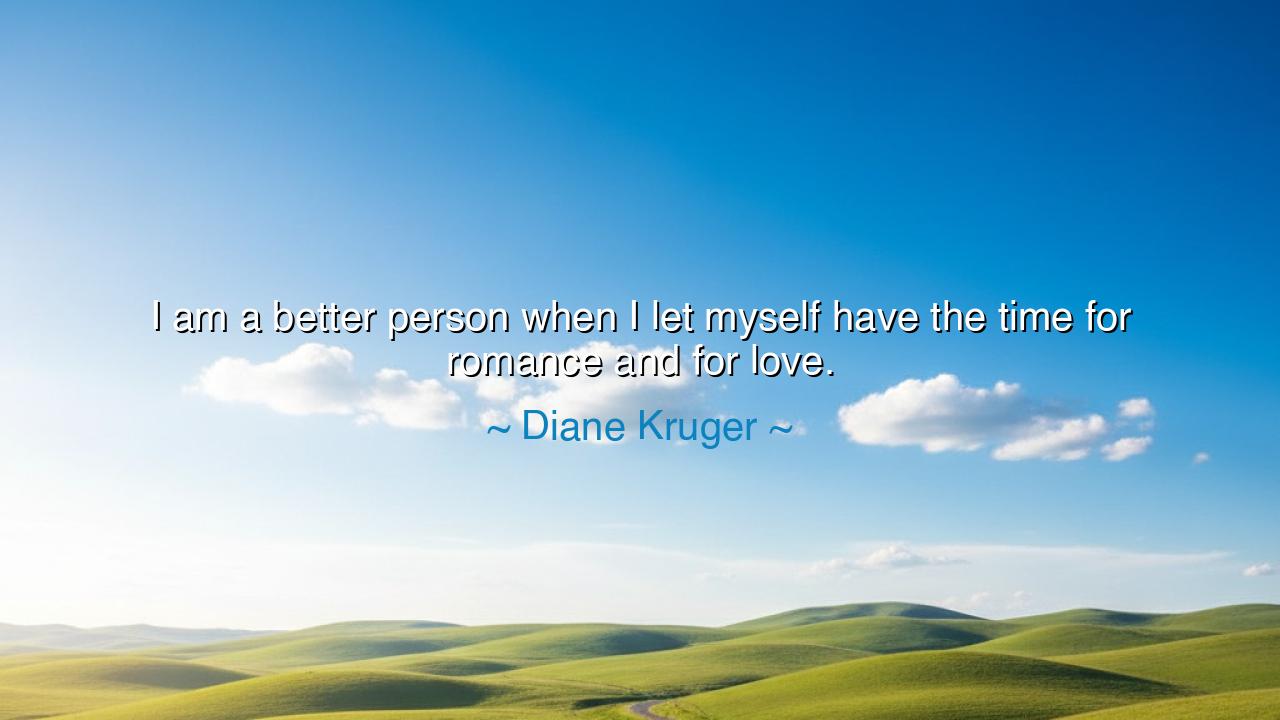
I am a better person when I let myself have the time for romance






The words of Diane Kruger shine with candor and wisdom: “I am a better person when I let myself have the time for romance and for love.” In this confession, she unveils an eternal truth—that the soul is not nourished by toil and ambition alone, but by tenderness, connection, and the sacred fire of romance. For what are we, if we deny ourselves love? Beings of stone, efficient but empty. To give oneself time for love is not weakness, but strength; it is to drink from the well that restores the spirit and makes us more human.
The ancients understood this balance. They knew that the warrior who never rests with his beloved grows hard, bitter, and cruel. Achilles had his battles, but he also had his Patroclus. Odysseus endured long years of war and wandering, but his heart remained anchored in Penelope. These stories remind us that greatness without love becomes hollow, while love brings depth, gentleness, and meaning to all striving. Kruger’s words echo this truth: romance is not a distraction from life, but the force that enriches and sanctifies it.
Her words also speak against the hurried pace of modern existence. How often do men and women sacrifice romance for work, success, or endless busyness? They believe love can wait, but in truth, the neglect of love corrodes the soul. Kruger recognizes that when she allows herself to embrace romance, she is transformed—not merely happier, but better. For love softens pride, strengthens patience, awakens kindness, and teaches humility. It is not luxury, but necessity.
Consider the life of Marcus Aurelius, the philosopher-king of Rome. Though known for his stoic wisdom, his writings reveal a man who cherished his wife Faustina and drew strength from her presence. He governed an empire, bore the burdens of war and plague, yet he understood that love was what kept him grounded in humanity. Without it, even the wisest philosopher risks becoming only a machine of reason. With it, he became not just ruler, but husband, father, and man.
There is also vulnerability in Kruger’s words. She admits that she must let herself have time for love—as though the world, or her own ambition, might forbid it. And so it is for many: we deny ourselves tenderness, thinking it slows us down. Yet she testifies that only by yielding to it does she become her truest self. Love is not in conflict with growth—it is the secret soil in which growth flourishes. Without it, we wither, even as we achieve.
The lesson is clear: do not neglect romance and love in the pursuit of other goals. For these are not distractions from the path, but companions that make the path worth walking. To love deeply is to be refined—your patience grows, your empathy deepens, your joy multiplies. The person who loves is more whole, more alive, more radiant. In denying yourself love, you deny yourself part of your own humanity.
Therefore, let all who hear these words take action: make time for romance. Guard moments of tenderness, seek opportunities for love, and never be ashamed of needing it. For in love you will find not only happiness, but transformation. You will become better, stronger, more compassionate. And when your days are done, it will not be your labors or triumphs that warm your soul, but the memory of those moments when you allowed yourself to love, and were loved in return.
Thus Diane Kruger’s words ring as both testimony and teaching: romance and love are not indulgences—they are the very breath of the soul. Take them into your life, and you will find yourself not diminished, but exalted.






AAdministratorAdministrator
Welcome, honored guests. Please leave a comment, we will respond soon